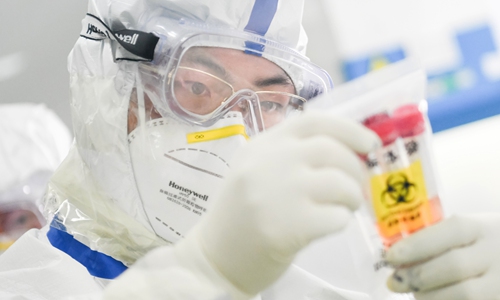HOME >> WORLD
UK mulls new measures amid coronavirus epidemic
By Sun Wei in London Source:Global Times Published: 2020/2/28 20:59:33

Photo: Xinhua
Two more patients tested positive for the coronavirus in the UK on February 27, bringing the total number of cases to 15.
More than 7,000 people in the UK have been tested for the virus. Of the 15 who have tested positive, eight have so far been discharged from hospital. Four confirmed cases among tourists repatriated to the UK from a cruise ship in Japan went straight into quarantine on their return to the UK.
On Wednesday, 300 staff were sent home after US oil firm Chevron in London's Canary Wharf was locked down over coronavirus fears. Chevron advised its workforce to work remotely after an employee reported flu symptoms on their return from a country where the deadly virus has spread.
At least 25 UK schools have sent staff and pupils home to self-isolate for 14 days after returning from half-term trips in northern Italy. There is currently an outbreak in parts of northern Italy, where more than 400 people have tested positive for the virus and 12 have died as of Thursday.
Schools in the UK have been keeping parents and students updated about the latest development of the COVID-19 epidemic, reminding them that if they have returned from countries with a COVID-19 outbreak and if they develop symptoms such as a cough, shortness of breath or fever, they should stay at home and call NHS 111.
Rebecca Travers, a mother of two, told the Global Times that she received frequent updates from her daughter's school. "We decided to stay at home for the half term break rather than travelling abroad as we normally do," Travers said, adding that she is trying to avoid crowds of people in public transport areas.
Public Health England (PHE) has said it is not advising that schools be shut in an attempt to stem the spread of the coronavirus. Medical Director Paul Cosford said he understood that schools have to take difficult decisions given the complexity of the issues that they are facing. He said PHE was available to talk to schools about their "specific circumstances" and to "help them make the right decisions."
Since Monday, "drive-thru" coronavirus testing has been introduced by the NHS, with people being swabbed in their own cars. The new scheme is part of efforts to relieve the pressure on ambulance and hospital services, amid concerns they could soon be overwhelmed by the number of tests they are carrying out.
Peter Ren, chairman of the British Chinese Entrepreneur Club, told the Global Times that businesses in Chinatown in London have been greatly affected, adding that Chinese in Britain are especially cautious about the risks.
"There are many fewer Chinese customers in restaurants and supermarkets in Chinatown," Ren noted. Some members of the British Chinese Entrepreneur Club reported that revenue has fallen by half or two thirds compared to the same period last year.
On the other hand, Chinese people in Britain are organizing donations of money and medical supplies to help Wuhan, the city at the center of the outbreak. The difficulties lie not only in the short supply but also the logistics, as many direct flights between the UK and China have been canceled, and transportation inside China is a headache as well, Ren said.
Chinese down jacket brand BOSIDENG turned its first show at London Fashion Week into a dramatic statement of support for China on February 16. "GO CHINA!" was the message, supported by friends of China from all over the world attending the event.
The risk level in the UK was raised to moderate after the World Health Organization declared it a public health emergency of international concern, according to the BBC.
Posted in: EUROPE